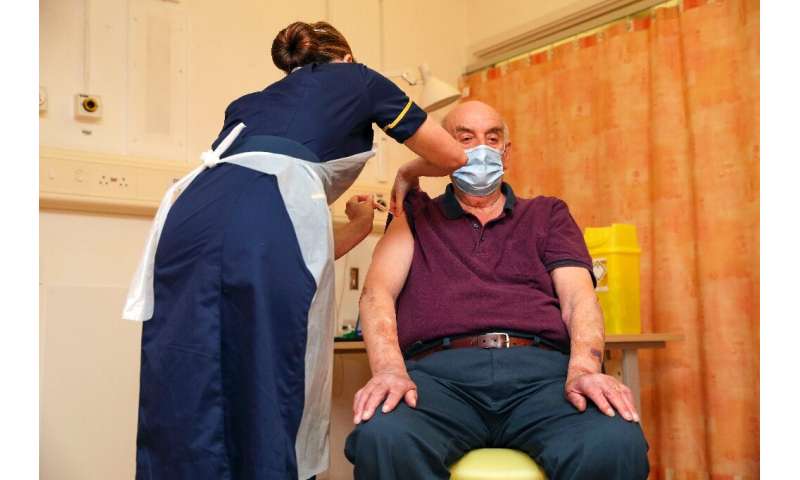
An 82-year-old man on Monday became the first person in the world to receive AstraZeneca and Oxford University’s new COVID jab outside a clinical trial, raising hopes the fight against a resurgent virus will accelerate.
But optimism the shot could turn the tide against the outbreak was tempered as Scotland said it would lock down again for the rest of the month, heaping pressure on UK Prime Minister Boris Johnson to follow suit.
Johnson will address the nation later on Wednesday to lay out what his spokesman said were steps to tackle the “rapidly escalating case numbers” blamed on a new variant of the virus.
Britain—one of the worst-affected countries by the global health crisis, with over 75,000 deaths—has been pinning its hopes on a mass vaccination drive to halt the resurgent virus.
But the speed of transmission of the new variant is causing widespread alarm, with more than 50,000 positive cases recorded across Britain every day for the last week.
Johnson said earlier on Monday there was “no question” the surge would mean tougher restrictions across England, as calls for a new nationwide lockdown grew.
Some 44 million people or more than three-quarters of England’s population are already being advised to stay at home and work remotely.
Non-essential shops have been shut, along with bars, restaurants and other hospitality and entertainment venues.
But those curbs have not noticeably slowed the steep rise in cases, and ministers are facing mounting pressure to delay the return of schools after the Christmas holiday.
The leader of the main opposition Labour party, Keir Starmer, on Sunday said national restrictions needed to be brought in “within the next 24 hours”.
“The virus is clearly out of control,” he added.
In Scotland, Sturgeon said the new variant accounted for more than half of all new cases, and she was “more concerned about the situation… than… at any time since March”.
The new measures, which include working from home and limits on two people from two households meeting outside, come into force from midnight (0000 GMT Tuesday), she added.
![]()
‘Normal life’
The announcement overshadowed the first Oxford/AstraZeneca vaccine given to a member of the public—part of what health chiefs have called Britain’s biggest ever vaccination drive.
Brian Pinker, a retired maintenance manager on dialysis for kidney disease, got the shot at an Oxford hospital, and said it was “the only way of getting back to a bit of normal life”.
Andrew Pollard, the director of the Oxford Vaccine Group that developed the vaccine, was among the first to receive it.
Some 530,000 doses are to be administered at new vaccination sites across Britain, adding to those already giving the Pfizer-BioNTech jab since early last month.
Johnson promised the number vaccinated “will be tens of millions by March”, despite concerns about the speed of the roll-out.
Health Secretary Matt Hancock described the next few weeks and months as a “difficult time” but said the vaccine offered hope for a return to normality.
The UK has already ordered 100 million doses of the vaccine, which Pollard has said could transform the world’s fight against the outbreak.
Britain became the first country in the world to approve the use of a vaccine produced by Pfizer-BioNTech on December 2, and has already given nearly one million people a first dose.
The Oxford/AstraZeneca vaccine is far cheaper than its rivals, costing about £2.50 ($3.40, 2.75 euros) per dose, making it affordable for developing countries.
It can also be kept in the fridge, while Pfizer-BioNTech’s requires storage at ultra-low temperatures.
AstraZeneca has said it plans to increase production capacity globally to up to 3 billion doses this year.
Source: Read Full Article
